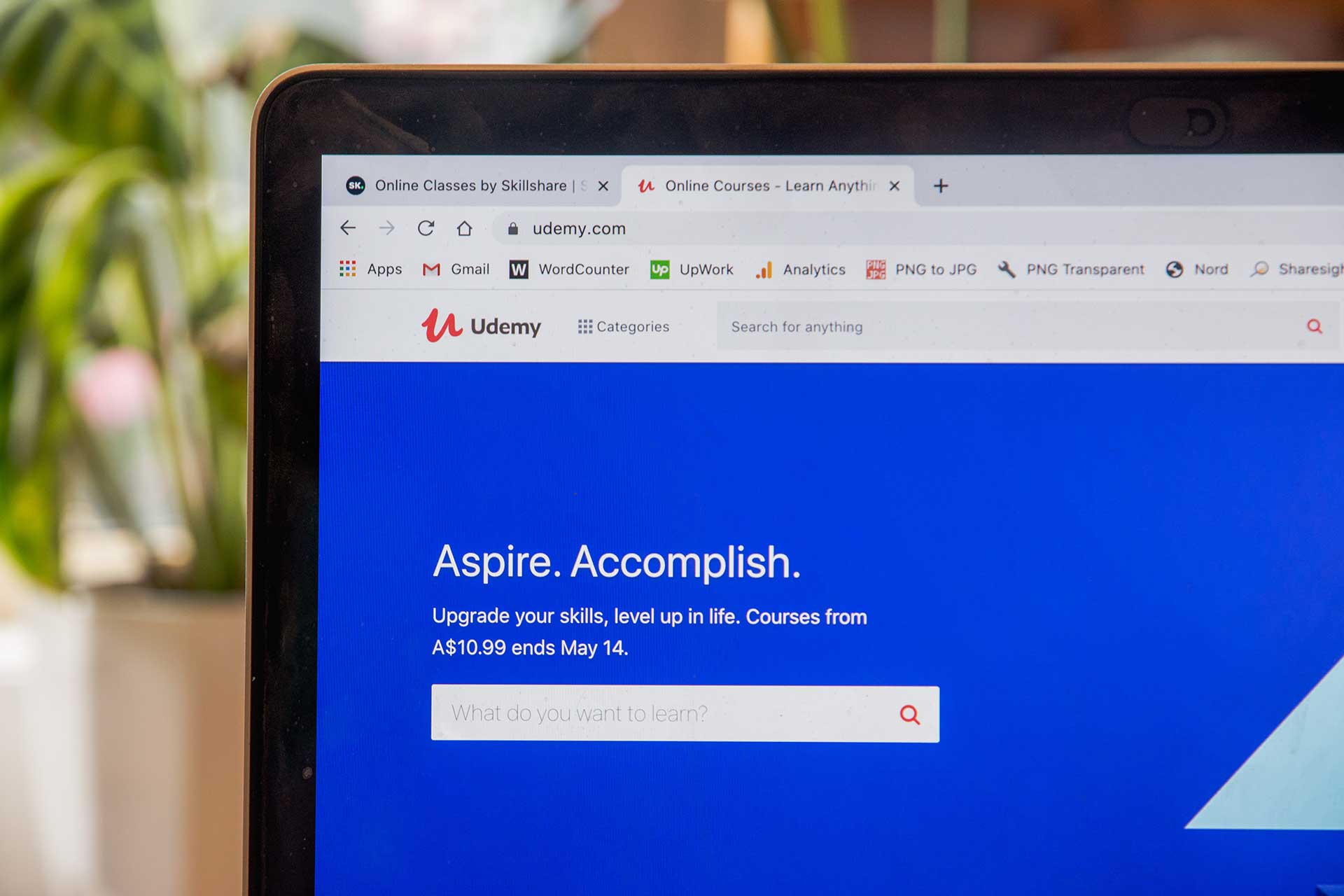With the UK remaining in some form of lockdown for the majority of 2020, this is proving to be a watershed year for fields as diverse as industry, government, entertainment, and transport. The same can be said of education: a part of life that typically involves gathering large numbers of people in a room or conference hall to share information and encourage personal growth. In this article, we’ll take a look at the education of the future, which, even now, is being developed at a breakneck pace to meet with the ‘new normal’ created by COVID-19.
Online Courses

Many people will be aware of the wealth of online courses offered at present, covering everything from basic algebra all the way through to astrophysics and computer engineering. Whether you find these formatted as MOOCs (Massive Open Online Courses) or the kinds of courses offered on digital education platforms, the proliferation of online education opportunities has been hugely exciting for those individuals who wish to get ahead, but cannot afford to attend a university or college in person.
We can expect these courses to expand in their scope, and develop in their efficiency, in the months and years to come. Indeed, we’re already seeing individuals taking the opportunity to work up new skills as they’ve been spending more and more time at home. For businesses, and those who are looking to enter into business, these courses are an excellent resource. They’re designed to be completed in a ‘binge’ or over many months. And, if you pay, you’ll get accreditation at the end of your course, too.
Lifelong Learning
Another phrase that we’ve heard bandied about in recent years has been ‘lifelong learning’. This might seem like a no-brainer to most people – it is, after all, quite difficult to go through life without learning new things – the specific target of this phrase is skills acquisition. Learning new skills, proponents of this phrase would argue, is now more of a requirement than an option, to keep pace with modern business developments.
To some extent, they’re absolutely right. Any worker over 40 will have seen a considerable shift in their working practices across the course of their lifetime, requiring them to learn how to use digital software and programs to continue producing work for their company. Even in an era where most employees are ‘digital natives’, there’s still development and evolution in the programs and technology individuals use – meaning that learning and skills acquisition will truly be lifelong.
Start-up Ethos

Meanwhile, for smaller companies, or those who are in the process of setting up as a start-up, the concept of education is part and parcel of what they do. Workers at start-ups learn on the job and are often forced to take up several disparate roles within their fledgling business. With many businesses putting their scaling and growth plans on hold during this pandemic lockdown, and the resultant economic decline, this is the perfect time for employees to perfect their skills so that they’re better able to perform their responsibilities when the economy boots up once more.
That’s why we see a surge in the business courses available across the internet during this period of lockdown. It’s also why the wisest educational institutions are opening their doors for short-term courses that can help businesses and their workers learn the new skills and knowledge they need to help drive the growth of the economy in the wake of the COVID-19 pandemic. Using this start-up ethos and asking your workers to take courses to help them perform better in their jobs, will help businesses flourish in 2021. Larger businesses should offer to cover the cost of online courses, too – helping invest in their workers’ futures.
Established Institutions

Many of the UK’s best universities are hunting grounds for the world’s most successful businesses. The quality of the facilities and the education on offer in these institutions attract the world’s biggest businesses, and those who graduate from the ‘red-brick’ universities are well set-up for the future. But, in a new era defined by COVID-19 and the inability to hold classes, these institutions are being forced to adapt at break-next speed.
We can already see some of these educational institutions working on alternatives to the traditional classroom, seminar, and lecture formats today. The University of Exeter Online has shared a number of their insights into how this might look in the future, and are adapting their classes and their courses for the ‘new normal’ in higher education. For businesses, entrepreneurs, and those who are soon to enter the job market, this is a developing field to watch – it’ll pave new ways in which to educate oneself in the future.
Training Modules

If you’re a business leader, you want to have the finest talent pool within your company to boost your productivity and increase your profits. One way to do this, as alluded to above, is to find university graduates with promising skills and knowledge to apply to your own company. But another way – and something that can be just as cost-effective – is to educate your current crop of employees, investing in the skills they need to boost their own productivity.
You’re able to organise this kind of development within your HR team. By assigning this team with the responsibility to train your employees in new skills, you’ll be able to step back and watch the entirety of your team training in how to operate within a new business climate that’s emerging. Some pressing new training modules might include:
- Training in cybersecurity, which is more important than ever now that staff are working remotely from their own devices
- Training in remote working, and on new platforms, to help them work better from a remote location
- Training in digital software that can help your staff members operate more efficiently in their work
All of these modules, and more, are readily available for businesses to tap into, simply by searching through some of the listings on business education websites.
Conferences and Workshops

Throughout your working year, you’ll have several dates in the calendar, which would usually involve you and some of your core team traveling to conference centers and workshops around the country. You may also attend expositions and trade fairs and industry meetups that are designed to help with marketing and networking. The ‘new normal’ has, of course, canceled the majority of these events, with a select few deciding to continue in an online-only capacity.
But, as we get increasingly used to the new demands of social distancing and the lack of on-site training offered by workshops and conferences, we’re certainly likely to see a growing number of online events circulating on social media and on industry websites. These will be resources that you and your staff should tap into, enabling you to still benefit from industry wisdom without having to spend cash and time to get to these annual events.
In-House Training

While there are myriad opportunities for you and your staff to educate yourself through third parties – and many institutions that individuals can visit to gain critical skills – you should also consider in-house training for your company. This is a long-term project and may take the majority of 2020 to plan out and execute. But, once you have this training set up, you’ll be able to get your workers trained in the specific skills that apply to your business.
So, whether that’s training in your particular internal processes and programs, or training in new skills that will help your company make a transition into a more modern, digital organization, you should undoubtedly consider education as a project to collaborate on while COVID-19 is reducing your workload and preventing you from hitting your sales targets for 2020.
The Learning Curve

Remote working and an alternative economy will be here to stay for some time after the pandemic is officially declared over – though we appear to be far from that moment at present. Workers are likely to demand home working as a part of their weekly routine in the coming months, and employers will need to adjust, too, to changing consumer habits, and changing markets, that are arising as a result of the current crisis.
All of this represents a steep learning curve for individuals and businesses and ascend together. The ‘new normal’ is likely to change the way we work, play, and learn – and all within a concise space of time. It’s this speedy change to all of our lives that constitute the watershed moment we’re currently living through. What’s certain is that, in the months to come, those individuals and companies that are best able to adapt will be the winners – and those companies that refuse to change will slowly lose their competitive advantage. Adaption is to become the critical differentiator in the world of business and educating your workers to adapt to this change is, therefore, a pressing priority as we head towards the second half of this tumultuous year.
These insights are all applicable to businesses and individuals who are considering new educational opportunities that are arising in the wake of the COVID-19 pandemic. Insights such as these should help to guide you towards a successful future within the emerging ‘new normal’ business environment.

























